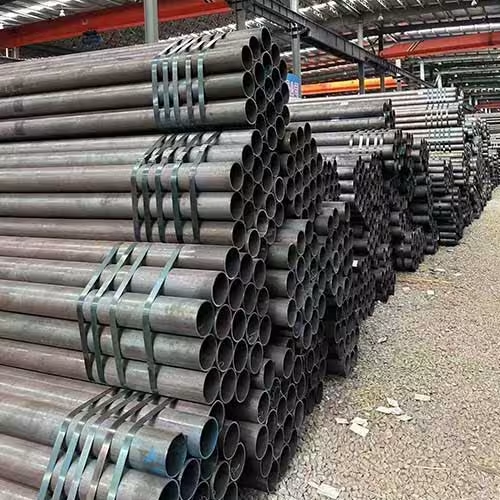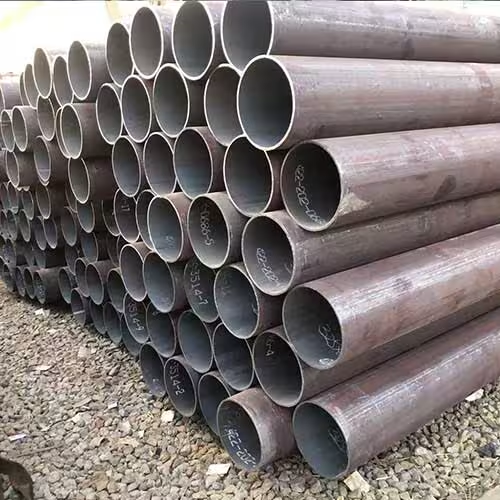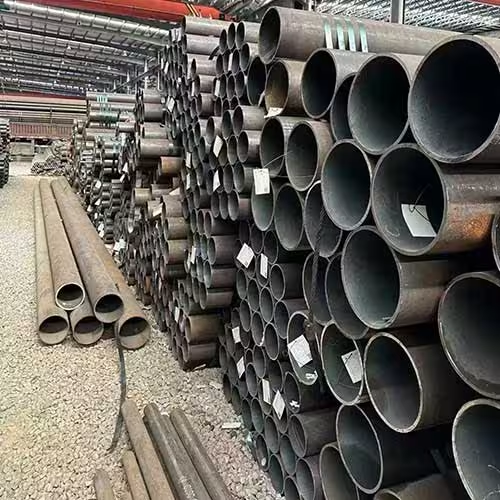Welcome to My Blog!
Before we dive into the content, I’d love for you to join me on my social media platforms where I share more insights, engage with the community, and post updates. Here’s how you can connect with me:
Facebook:https://www.facebook.com/profile.php?id=61565500692293
Now, let’s get started on our journey together. I hope you find the content here insightful, engaging, and valuable.
Table of Contents
Introduction

Carbon steel pipe is a type of steel tubing made primarily from iron and carbon, with trace amounts of other elements. Its mechanical properties, including high tensile strength and resistance to wear, make it ideal for demanding industrial environments. Available in seamless and welded forms, carbon steel pipe is manufactured in various grades and sizes to meet specific requirements, from high-pressure systems to structural frameworks. The applications of carbon steel pipe span multiple industries, including oil and gas, construction, water treatment, and manufacturing, where its durability and cost-effectiveness shine.
This guide delves into the key industries that rely on carbon steel pipe, the types of pipes used, and the factors that make them indispensable.
Why Carbon Steel Pipe Is Widely Used in Industry
Exceptional Strength and Durability
One of the primary reasons for the widespread applications of carbon steel pipe is its exceptional strength and durability. Carbon steel’s high tensile strength allows it to withstand significant pressure and mechanical stress, making it suitable for transporting fluids, gases, and solids in harsh conditions. Its durability ensures long service life, reducing maintenance and replacement needs.
Versatility Across Environments
Carbon steel pipe is highly versatile, performing reliably in diverse environments, from extreme temperatures to corrosive settings (when properly coated or treated). This adaptability enables its use in applications ranging from underground pipelines to high-temperature industrial processes, meeting the needs of various industries.
Cost-Effectiveness
Compared to materials like stainless steel or exotic alloys, carbon steel pipe offers a cost-effective solution without compromising performance. Its affordability, combined with robust mechanical properties, makes it a go-to choice for large-scale projects where budget and reliability are critical considerations.
Key Applications of Carbon Steel Pipe
Oil and Gas Transportation
The oil and gas industry is one of the largest consumers of carbon steel pipe, using it for pipelines that transport crude oil, natural gas, and refined products over long distances. Seamless carbon steel pipe is preferred for high-pressure applications, while welded pipe is used for less demanding systems. Its strength and resistance to stress corrosion cracking ensure safe and efficient transport.
Water and Wastewater Systems
Carbon steel pipe is widely used in water supply and wastewater treatment systems, where it supports the distribution of potable water and the collection of sewage. Coated or lined carbon steel pipe resists corrosion from water and chemicals, ensuring reliable performance in municipal and industrial water infrastructure.
Construction and Structural Frameworks
In construction, carbon steel pipe serves as a structural component in buildings, bridges, and industrial facilities. Its high strength-to-weight ratio makes it ideal for load-bearing columns, piling, and scaffolding. The applications of carbon steel pipe in construction also include HVAC systems and fire sprinkler networks.
Power Generation and Energy
Power plants, including fossil fuel, nuclear, and renewable energy facilities, rely on carbon steel pipe for steam, cooling, and fuel delivery systems. Its ability to handle high temperatures and pressures makes it essential for boilers, turbines, and heat exchangers, supporting efficient energy production.
Manufacturing and Process Industries
In manufacturing, carbon steel pipe is used to convey raw materials, chemicals, and finished products within production facilities. Industries like petrochemicals, food processing, and pharmaceuticals depend on carbon steel pipe for its durability and compatibility with various substances, ensuring smooth operations.
Comparison Table of Carbon Steel Pipe Applications
| Industry | Application | Type of Carbon Steel Pipe | Key Benefits | Considerations |
|---|---|---|---|---|
| Oil and Gas | Long-distance pipelines, drilling systems | Seamless, Welded | High pressure resistance, durability | Corrosion protection needed |
| Water and Wastewater | Water mains, sewage lines | Coated/Lined Welded | Corrosion resistance, long lifespan | Regular maintenance for coatings |
| Construction | Structural columns, HVAC, fire sprinklers | Seamless, ERW | High strength, versatility | Proper sizing for load requirements |
| Power Generation | Boilers, heat exchangers, steam lines | Seamless, High-Grade | High temperature/pressure tolerance | Thermal expansion considerations |
| Manufacturing | Material transport, chemical processing | Welded, Seamless | Compatibility with diverse substances | Chemical compatibility verification |
This table provides a snapshot of the applications of carbon steel pipe across industries, highlighting the types of pipes used, their benefits, and key considerations. It serves as a quick reference for professionals selecting carbon steel pipe for specific projects.
Types of Carbon Steel Pipe and Their Applications

Seamless Carbon Steel Pipe
Seamless carbon steel pipe, made without welds, offers superior strength and pressure resistance, making it ideal for high-pressure applications like oil and gas pipelines and power plant boilers. Its uniform structure reduces the risk of leaks, ensuring reliability in critical systems.
Welded Carbon Steel Pipe
Welded carbon steel pipe, produced by joining steel plates or coils, is cost-effective and suitable for less demanding applications, such as water distribution and structural frameworks. Electric Resistance Welded (ERW) and Longitudinal Submerged Arc Welded (LSAW) pipes are common types used in various industries.
Coated and Lined Carbon Steel Pipe
To enhance corrosion resistance, carbon steel pipe is often coated with materials like epoxy or zinc or lined with cement or polyethylene. These treatments extend the pipe’s lifespan in applications like water treatment and chemical processing, where exposure to corrosive substances is a concern.
Factors Influencing the Applications of Carbon Steel Pipe
Material Grades and Specifications
Carbon steel pipe is available in various grades, such as ASTM A106, A53, or API 5L, each designed for specific applications. The choice of grade depends on factors like pressure, temperature, and environmental conditions, ensuring the pipe meets performance requirements.
Corrosion Protection
While carbon steel pipe is durable, it is susceptible to corrosion in certain environments. Protective coatings, cathodic protection, and linings are applied to mitigate this risk, particularly in water, wastewater, and oil and gas applications, extending the pipe’s service life.
Manufacturing Standards
The applications of carbon steel pipe are governed by standards like ASTM, ASME, and API, which specify dimensions, mechanical properties, and testing requirements. Compliance with these standards ensures safety and reliability in demanding industrial settings.
Maintenance and Care for Carbon Steel Pipe Systems
Regular Inspections
To ensure the longevity of carbon steel pipe, regular inspections are essential. Techniques like ultrasonic testing and visual inspections detect corrosion, cracks, or wear, allowing for timely repairs and preventing system failures.
Corrosion Mitigation
Applying and maintaining protective coatings or cathodic protection systems is critical for carbon steel pipe in corrosive environments. Routine checks ensure coatings remain intact, preserving the pipe’s integrity.
Proper Installation
Correct installation of carbon steel pipe, including proper alignment, support, and joint integrity, prevents stress and premature failure. Following manufacturer guidelines and industry standards during installation is crucial for optimal performance.
Advancements in Carbon Steel Pipe Applications

Improved Manufacturing Techniques
Advances in manufacturing, such as automated welding and precision rolling, have enhanced the quality and consistency of carbon steel pipe. These improvements support more reliable applications in high-pressure and high-temperature systems.
Eco-Friendly Coatings
The development of environmentally friendly coatings, such as non-toxic epoxies and recyclable linings, has expanded the applications of carbon steel pipe in sustainable projects. These coatings reduce environmental impact while maintaining performance.
Integration with Smart Technologies
Smart sensors and monitoring systems are increasingly integrated with carbon steel pipe systems, enabling real-time detection of leaks, corrosion, or pressure changes. These technologies enhance safety and efficiency in critical applications like oil and gas pipelines.
Conclusion
The applications of carbon steel pipe are vast and varied, underpinning the infrastructure of industries that drive the global economy. From transporting oil and gas to supporting water systems and construction projects, carbon steel pipe delivers unmatched strength, versatility, and cost-effectiveness. By understanding its applications, types, and maintenance needs, professionals can make informed decisions to optimize performance and ensure safety.
As manufacturing techniques and protective technologies continue to evolve, carbon steel pipe will remain a vital component of industrial progress, supporting innovation and reliability for years to come.
FAQ
What are the main applications of carbon steel pipe?
The primary applications of carbon steel pipe include oil and gas transportation, water and wastewater systems, construction, power generation, and manufacturing, where its strength and durability are critical.
Why is carbon steel pipe preferred over other materials?
Carbon steel pipe is favored for its high strength, cost-effectiveness, and versatility, making it suitable for a wide range of industrial applications, from high-pressure pipelines to structural frameworks.
What types of carbon steel pipe are used in industry?
Seamless carbon steel pipe is used for high-pressure applications, welded pipe for cost-effective solutions, and coated/lined pipe for corrosion-prone environments, each tailored to specific needs.
How is corrosion managed in carbon steel pipe applications?
Corrosion in carbon steel pipe is managed through protective coatings (e.g., epoxy, zinc), linings (e.g., cement), and cathodic protection systems, along with regular inspections and maintenance.
Are there environmental concerns with carbon steel pipe?
While carbon steel pipe is durable, corrosion can lead to leaks if not managed. Eco-friendly coatings and recycling initiatives mitigate environmental impact, supporting sustainable applications.

